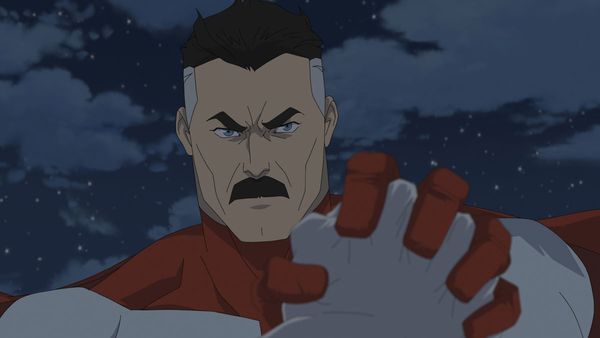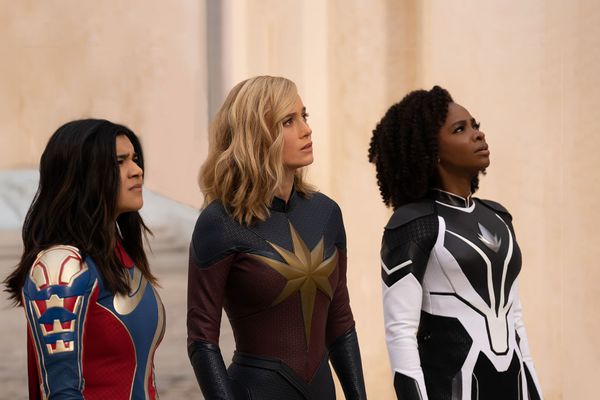Why cynical superhero stories, not “The Marvels,” have power
Can superheroes save cinema? According to “The Marvels,” the Marvel Cinematic Universe movie that debuted earlier this month with the lowest opening weekend in MCU history, it’s not likely. The sequel to “Captain Marvel” sees Brie Larson reprise her role as the titular superhero to save the universe but few seemed to care. Projected to make $60 to $80 million in its first weekend, “The Marvels” made only about half of that at $47 million — compared to the first movie raking in $153.4 million in 2019.
The standard superhero narrative is failing because people no longer trust in saviors.
MCU movies are typically instant money-makers which makes “The Marvels” – alongside “Ant-man and the Wasp: Quantumania,” another box office flop from this year – peculiar. Some speculate it’s superhero fatigue; others wonder if the MCU fanbase is getting too old. But an overlooked trend indicates it’s neither: The standard superhero narrative is failing because people no longer trust in saviors. Instead, satirical, antihero superheroes are on the rise.
After the Black Lives Matter protests in 2020, more and more people have awoken to the fact that the police, our supposed real life superheroes, may not be protectors but rather the instigators of harm. They disproportionately target Black people, use excessive force against them that result in the unjust murder of Black lives like George Floyd, weaponize their power against women and are often shielded from facing justice by our own legal system. TV wasn’t immune to this reckoning. In the wake of the protests, shows made an effort to pull back on copaganda with decades-long favorites like “Brooklyn Nine Nine” and “Cops” coming to an end because of it. Just as the depiction of police were rethought in order to avoid glorifying them, so too did superheroes. Now, they’re not shown to be the faultless bastions of good they were cracked up to be.
Now we have shows like “The Boys,” spinoff “Gen V” and the “Invincible” – all on Prime Video – that satirize superheroes by turning them into villains who revel in violence. The Season 1 finale of the animated “Invincible” captures this in a nutshell. The series created by “The Walking Dead’s” Robert Kirkman follows Mark Grayson (voiced by “Beef” star Steven Yeun) as he adjusts to having invincible powers and becoming a superhero like his dad, Earth’s favorite hero, Omni-Man (J.K. Simmons). But Omni-Man is hiding a secret: he’s not here to save Earth, he’s here to conquer it. As a member of the alien Viltrumite race, he believes that the Viltrumites are the superior species and thus are justified in their quest to colonize everyone else. Sound familiar?
 Omni-Man (J.K. Simmons) in “Invincible” (Prime Video)Things come to a head in the finale when Omni-Man reveals to his son his true intentions as an intergalactic colonizer in order to sway Mark to his cause. What follows is what Vulture describes as “one of the most harrowing episodes of superhero TV ever produced”: Omni-Man brutalizes any civilian in his vicinity like ragdolls to prove to Mark how humans are inferior and expendable. In the most gripping scene, he holds Mark by the head to run through the Chicago subway, using Invincible’s durable noggin to rip the train apart and kill every passenger on board. After, a news report reveals how the people’s revered hero is the one behind all the violence, a reckoning with corruption that, animation and aliens aside, could easily pass as 2020.
Omni-Man (J.K. Simmons) in “Invincible” (Prime Video)Things come to a head in the finale when Omni-Man reveals to his son his true intentions as an intergalactic colonizer in order to sway Mark to his cause. What follows is what Vulture describes as “one of the most harrowing episodes of superhero TV ever produced”: Omni-Man brutalizes any civilian in his vicinity like ragdolls to prove to Mark how humans are inferior and expendable. In the most gripping scene, he holds Mark by the head to run through the Chicago subway, using Invincible’s durable noggin to rip the train apart and kill every passenger on board. After, a news report reveals how the people’s revered hero is the one behind all the violence, a reckoning with corruption that, animation and aliens aside, could easily pass as 2020.
The second season, which began early this month, hints at Mark shedding his staunch morality and ethics for his own villain arc and joining in his father’s quest. Whether or not he has an about-face or this turns out to be an alternate multiverse version of Invincible, the show continues to challenge the idea that superheros aren’t automatically ethically good — and clearly this subversion is appealing. After just one episode, “Invincible” has already tripled its viewership for Season 2.
“The Boys” shares in the grotesque brutality of “Invincible.” In the third season, Termite (Brett Geddes) a character who can become very small or very large becomes tiny to dive into a urethra and take their erotic night to new heights — only to accidentally sneeze and, in doing so, becomes large again, exploding his partner from within. It’s a . . . creative metaphor for the dangers of having too much power and wielding it frivolously without fear of the consequences. It’s almost as if superheroes are also covered by qualified immunity that protect police from facing justice when violating constitutional rights.
But such is the running theme of the series. In this world, superpowers are commonplace, and the best of them dream of being in The Seven – the evil, Avengers-like counterparts of superheroes, aka supes. Behind them is Vought International, a corporate conglomerate that pulls the strings of The Seven, the government and the military. Just as police and prisons are marketed as a form of protecting the public but is really a part of a larger economic system that incentivizes the government and companies to incarcerate mass amounts of poor and Black citizens, the supes in “The Boys” are a part of larger entertainment scheme for Vought to sell and exploit. In Season 2, the CEO of Vought reveals to head villain Homelander (Antony Starr) that Vought isn’t actually a superhero company, it’s a pharmaceutical one that secretly manufactures the drug that gives people superhuman powers. And oh yeah, the company was also founded by a Nazi.
These newer superheroes won’t let us forget: the people meant to protect us are in the position to do us the most harm.
The racist and capitalistic infrastructure of superheroes in “The Boys” makes the show that much more disturbing, because it’s not just fantasy; it’s real life. In the latest season, there’s an even more direct relation to the show’s universe and real life when the only Black member of The Seven, A-Train (Jesse T. Usher), must do surface-level outreach to win the “Black vote” and comes to learn that the supes unjustly target Black citizens.
This could sound like a miserable experience to watch, but the themes are resonating, and the numbers don’t lie. “The Boys” was named the most popular show on Prime Video in 2022 when it aired its third season. It was so popular it got its own spinoff this year, “Gen V,” which debuted on Nielsen’s Streaming Originals chart after it amassed 374 million minutes views after only three episodes. A second season has already been confirmed.
These newer superheroes won’t let us forget: the people meant to protect us are in the position to do us the most harm. Even in “Spider-Man: Across the Spider-Verse,” the antagonist turned out to be one of the spider-men, and that sequel was rewarded in the vein of $120.5 million at the box office for it. “Guardians of the Galaxy Vol. 3” saw similar success with $118 million at the box office, which makes sense given it follows a group of misfits and outlaws who, this time around, tackle OrgoCorp, a bioengineering corporation not unlike Vought International that illegally experiments on others.
These superhero success stories reflect society’s growing suspicions towards institutions. Viewers are no longer interested in the patriotic, individualistic hero worship à la Captain America. Perhaps instead the narrative can finally return to its roots when heroes used to be politically radical icons who fought against hierarchies. Jerry Siegel and Joe Shuster’s 1938 Superman was a populist hero who fought landlords and the wealthy. Wonder Woman used to extol feminism decades before its time, and it was co-created by polyamorous author William Moulton Marston.
 Iman Vellani as Ms. Marvel/Kamala Khan, Brie Larson as Captain Marvel/Carol Danvers, and Teyonah Parris as Captain Monica Rambeau in “The Marvels” (Laura Radford/Marvel)This more subversive superhero trend sets the stage for why “The Marvels” flopped. It marketed itself as another run of the mill hero storyline with its final trailer full of the typical hero worship, Avengers and . . . Iron Man (whom, last we checked was dead).
Iman Vellani as Ms. Marvel/Kamala Khan, Brie Larson as Captain Marvel/Carol Danvers, and Teyonah Parris as Captain Monica Rambeau in “The Marvels” (Laura Radford/Marvel)This more subversive superhero trend sets the stage for why “The Marvels” flopped. It marketed itself as another run of the mill hero storyline with its final trailer full of the typical hero worship, Avengers and . . . Iron Man (whom, last we checked was dead).
It failed to convey that the movie was not actually that: Captain Marvel was not a faultless heroine, but through her own hubris caused devastation to a planet, igniting this new film villain’s origin story. While actors may not have been able to market the film due to the SAG-AFTRA strike, the promotion for the movie buried the real lede: the tainted history and shortcomings of Captain Marvel.
Want a daily wrap-up of all the news and commentary Salon has to offer? Subscribe to our morning newsletter, Crash Course.
As TV’s new breed of grayscale supes show us, that concealment is pivotal. In an age where a tech bro has undermined democracy with an anti-woke and antisemtic platform, a former president is charged with stealing an election and people are marching on the streets because the U.S. government sells weapons to enable massacre, it makes sense that our superhero content has shifted to capture our growing opposition to those meant to keep us safe. If the system wasn’t created to save us, then superheroes won’t either.
Read more
about this topic

